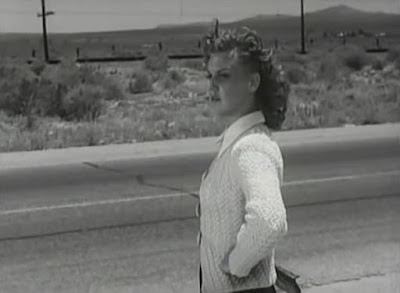Incidentally, Detour is fairly short and in the public domain, so you can easily watch it right now if you want to. And here's a better version. Some of what follows might be called spoilers. You have been warned!
Now, the first thing you may notice about Detour is that it doesn't exactly have the highest production values. Directed by Edward G. Ulmer, a Jewish-Moravian immigrant who spent his obscure career on the fringes of Hollywood, it's a "poverty row" picture, having been produced by a B-movie studio on the cheap. It's hard not to smile at its goofs and shortcuts. The foggy backlot "New York" street scene. The awkward one-sided phone "conversation." The hitchhiking scenes in which the filmstrip has been reversed, so that the action moves from right to left, that is, east to west, resulting in drivers mysteriously sitting on the wrong side of the car. The rambling voice-over with its attempted hardboiled wisecracks sounding as though shouted into a bathtub.
Somehow, though, it all contributes to an atmosphere of profound desperation, which, in some weird way, actually adds to the film. And I tell you, it's as gloriously seedy and guilty as films noir come. It fits the description with which I began this series perfectly:
Films noir tend to involve detached or alienated elements of a fragmented society chained by the relentless logic of guilt and futility, using low-key lighting and visual abstraction to create an atmosphere of moral and emotional detachment. The settings are generally seedy, the scale is small, and the characters are bit players on the world stage.Detour opens with Al Roberts (Tom Neal), a disheveled, paranoid traveler, sitting in a diner, picking fights with customers, soliloquizing about fate. Once he was a fairly happy piano player; now he's a guy forever cut off from society. From the first moment you see his self-pitying mug, it's hard not to dislike him.
 |
| That's life. Whichever way you turn, Fate sticks out a foot to trip you. |
 |
| Ever done any hitchhiking? It's not much fun, believe me. |
I guess at least an hour passed before I noticed those deep scratches on his right hand. They were wicked: three puffy red lines about a quarter inch apart.Haskell's a friendly guy. Unfortunately, Roberts accidentally kills him by letting him crack his skull on a rock in the middle of a rainstorm.
 |
| Until then I had done things my way, but from then on something stepped in and shunted me off to a different destination than the one I'd picked for myself. |
 |
| What kind of dames thumb rides? Sunday school teachers? |
 |
| The world is full of skeptics. |
Despite my jibes about its production values, I find Detour a fine piece of directing. And Ann Savage's Vera, a vicious, trashy, not-very-intelligent schemer who enjoys having Roberts at her mercy, is the best thing about it. Supposedly a trucker actually tried to pick her up while they were filming the hitchhiking scene, they'd made her look so realistic; in this interesting interview, Savage notes how unusual it was at the time to let a leading lady appear so unglamorous.
 |
| "Know how to work it?" "I invented it." |
 |
| Too bad! I wanted to get tight tonight! |
 |
| Listen, mister, I been around, and I know a wrong guy when I see one. What'd you do, kiss him with a wrench? |
Personally, I have a hard time believing that a writer or director would create something with such a well-layered double meaning without somehow calling attention to the fact within the narrative. But the theory wouldn't have come into being if Roberts the character and the film as a whole didn't seem so very guilty.
Detour ends with an arrest added in to get past the Hays office, but it's clearly only hypothetical, a part of Roberts' soliloquy. Roberts goes his way, free but damned, disappearing into the murky night of film noir, trapped by fate, a placeless, nameless unperson.
One last note about the actor, Tom Neal. He dated the actress Barbara Payton both before and during her engagement to Franchot Tone; he and Tone came to blows over it in her front yard, and he beat Tone severely while she watched. That pretty much ended his Hollywood career. Later in life Neal became a landscape gardener. In 1965 he was involved in the death of his wife. According to him, they'd gotten into a tussle with a gun, which had accidentally discharged and shot her in the head. He was convicted of involuntary manslaughter.
* * *
Despite the fact that Detour is literally a B film, with B production values, I give it a grade of A for awesome on the following scale:
- A: awesome noir film, to be owned and watched a zillion times or until you have it memorized
- B: good (bueno) noir film with excellent passages but significant flaws, to be watched on occasion
- C: fairly commonplace noir film, to be watched once or twice
- D: dud of a noir film, to be avoided if possible
Takeaway quote:
"Fate, or some mysterious force, can put the finger on you or me for no good reason at all."





Amazing movie. I consider Ann Savage the defintive femme fatale
ReplyDeleteI don't think I've seen her in anything else. I looked up her filmography, and her other films seem to be pretty obscure. Too bad -- I think she's very good.
DeleteI'm afraid that this movie didn't help her career: the movie was too bleak, and her role lacked the siren-like glamour of other femmes fatales.
ReplyDelete